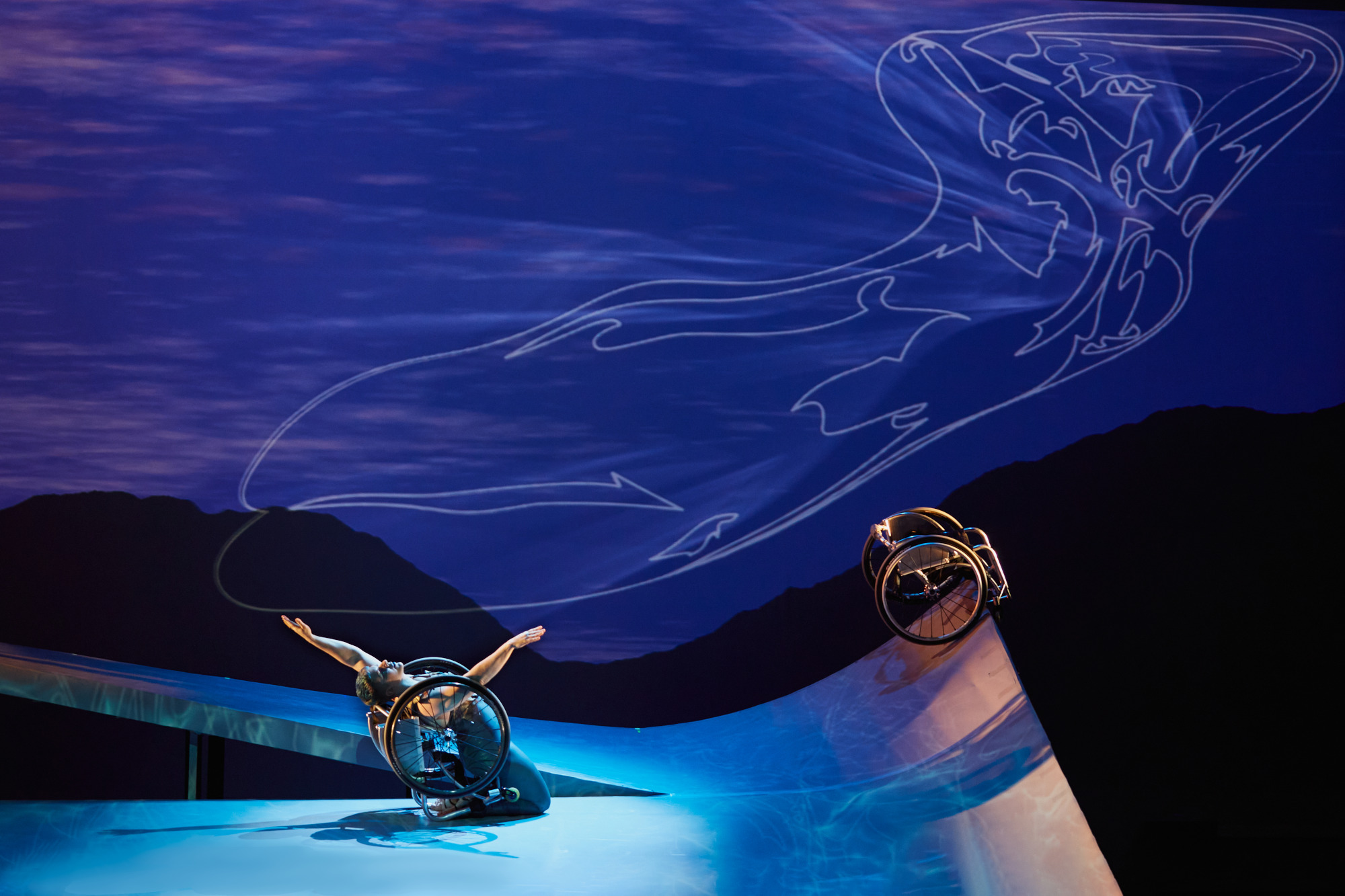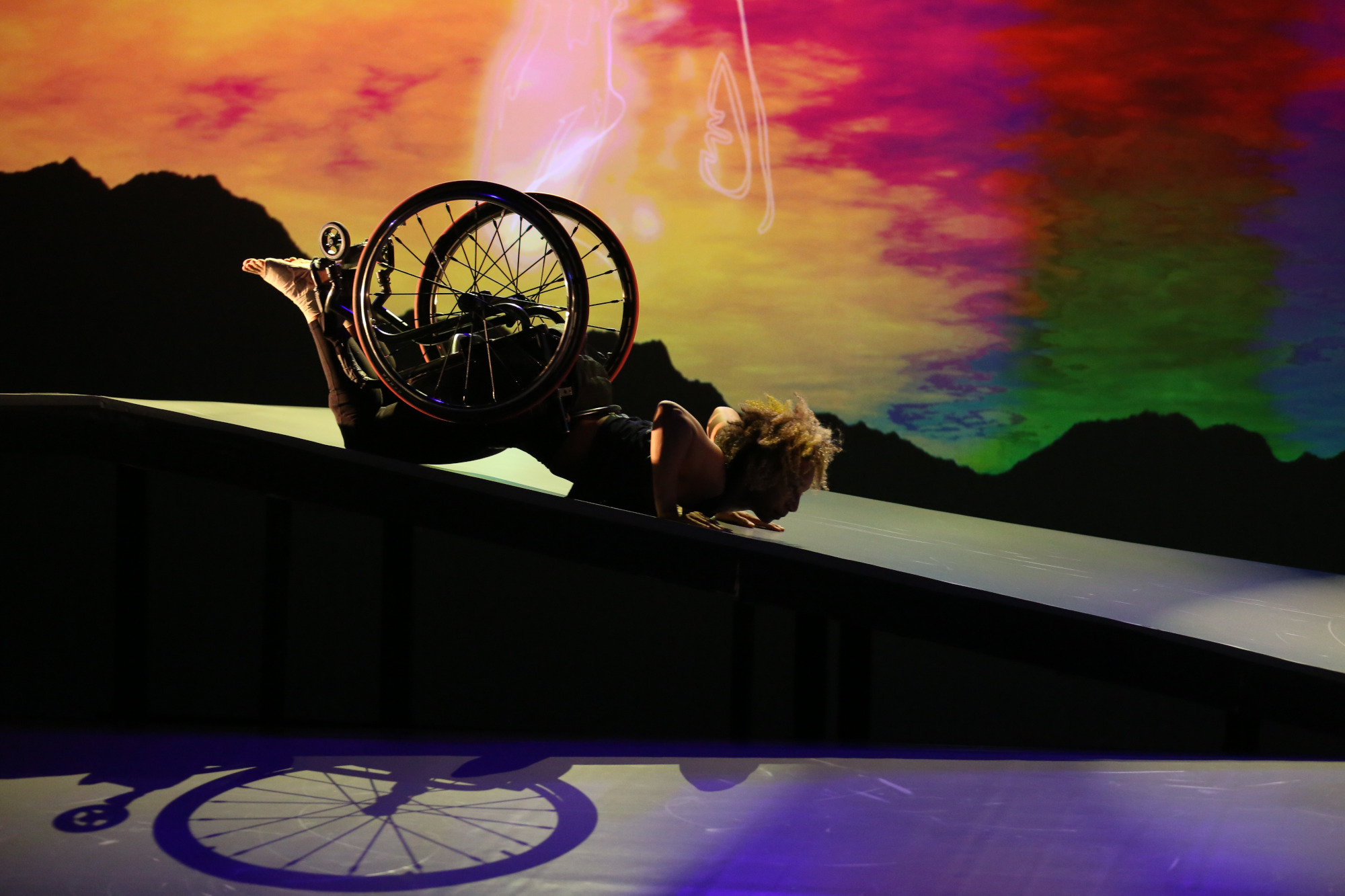
- "DESCENT models a truth that is rarely understood among dance audiences: Disability does not signify incompleteness. In fact, it offers novel pathways to several movement styles, each of them whole and generative of unique choreographic forms.”
- — KEVIN GOTKIN, DANCE MAGAZINE
- “Ms. Sheppard has been an innovator in disability arts, and this work illustrates just how much she’s expanded the notion of physicality in dance.”
- — BRIAN SCHAEFER, THE NEW YORK TIMES
DESCENT is the first touring production created by the disability art ensemble Kinetic Light.
Performed on an architectural ramp installation with hills, curves and peaks, DESCENT celebrates the pleasure of reckless abandon. The evening-length duet takes audiences on a transformative ride through the queer, interracial love-story of the mythical figures Venus and Andromeda, obliterating assumptions of what dance, beauty, and disability can be.
In 2018, DESCENT premiered in New York City to a sold-out crowd that came from around the world. Since then, the performance has been selected to be part of the 2019 United States presentation at the Prague Quadrennial of Performance Design and Space, and the show was voted “Most Moving Performance,” 2018 Dance Magazine Reader’s Choice.
DESCENT begins with Auguste Rodin’s Toilette of Venus and Andromeda. Andromeda is embodied by Alice Sheppard, visually restoring the racial heritage that Rodin himself erased. Venus is assumed by Laurel Lawson, who both challenges and realizes Rodin’s imaginations of Venus and ideals of feminine beauty. Venus and Andromeda claim their desire, as wheels fly within inches of the ramp’s edge. Their spines soften to taste the subtle pulls of gravity and arch into the sumptuous immersive light created by Michael Maag.
The DESCENT ramp stage set was designed by Sara Hendren, Yevgeniya Zastavker, and students of Olin College, with the support of the college.
 Andromeda perches out of her wheelchair on the sharp peak of the ramp. From atop of this mountain, she looks directly into our eyes. Her hair is flame red; a constellation of stars sparkles behind her. Photo: BRITT/Jay Newman
Andromeda perches out of her wheelchair on the sharp peak of the ramp. From atop of this mountain, she looks directly into our eyes. Her hair is flame red; a constellation of stars sparkles behind her. Photo: BRITT/Jay Newman
 Venus, bathed in starlight, rests against the ramp. Her back muscles ripple as her arms extend; she gazes down the slope of the ramp. Photo: BRITT/ Jay Newman
Venus, bathed in starlight, rests against the ramp. Her back muscles ripple as her arms extend; she gazes down the slope of the ramp. Photo: BRITT/ Jay Newman
 With blonde hair flowing down his back to the edge of his wheelchair, Michael Maag sits at his command station. Surrounded by multiple digital displays, he looks over the empty theater seats at the lights onstage. Photo: Lisa Niedermeyer
With blonde hair flowing down his back to the edge of his wheelchair, Michael Maag sits at his command station. Surrounded by multiple digital displays, he looks over the empty theater seats at the lights onstage. Photo: Lisa Niedermeyer
The Ramp
“The stage, known as the ramp, has all the features of other dance surfaces, but its inclined planes and curves do more than frame the dance. The ramp creates a movement vocabulary that has never existed before.” Georgina Kleege: “What the Ramp Teaches Us”
Credits
Choreography and Performance: Alice Sheppard, in collaboration with Laurel Lawson
Lighting, Projection, and Video Design: Michael Maag
Revival Lighting: Annie Wiegand
Costume and Makeup Design: Laurel Lawson
Artistic Director: Alice Sheppard
Premiere Producing Director: Lisa Niedermeyer
Premiere Production Stage Manager: Tiffany Schrepferman
Premiere Lighting Supervisor: Tim Smith
Additional Video: Eric Brucker and Ryan Jenkins
Dramaturg: Melanie George
Music Editor: Dan Wool
RAMP Design Team: Sara Hendren, Yevgeniya Zastavker, and Katie Butler, Daniel Daugherty, Duncan Hall, Andrew Holmes, Erica Lee, Scott Mackinlay, Apurva Raman, March Saper, Alexander Scott, Kimberly Winter, Rachel Yang, Jingyi Xu, with support from Olin College. Ramp Engineering and Fabrication by Rooster Productions LLC , a small employee-owned scene shop located in Martinez, CA.
Music Score Composer and Cello Player: Joan Jeanrenaud, from the album Visual Music, with performers PC Muñoz and William Winant on Deconet Records, 2016. With the kind permission of the composer. JJCello.com
Additional Music: “Songs of Songs” by Karen Tanaka, used by arrangement with G. Schirmer Inc. publisher and copyright owner. “Empty Infinity” by composer and violinist Cornelius Dufallo from the album Journaling on Innova Recordings, 2012. With the kind permission of the composer.
Consultants
Benvenuti Arts: grantwriting
CyCore Systems: Audimance app design and development, engineering and digital support
Joseph Futral: Production management
Mariclare Hulbert: Publicity
P.S. 314, INC.
Descent Funders
DESCENT was made possible, in part, by the New England Foundation for the Arts’ National Dance Project; the MAP Fund; Dance/NYC’s Disability. Dance. Artistry Fund; and the Maggie Allesee National Center for Choreography at Florida State University. Kinetic Light researched, developed and honed DESCENT with financial, administrative and residency support from the Dance in Process program at Gibney Dance. DESCENT was also supported by Dancers’ Group’s CASH grant program, the Awesome Foundation, Puffin Foundation West, Ltd., and the Yip Harburg Foundation.